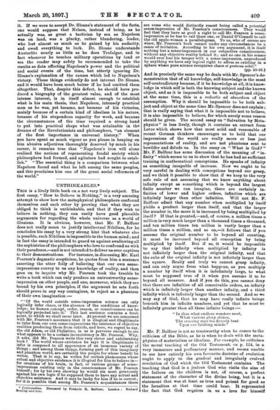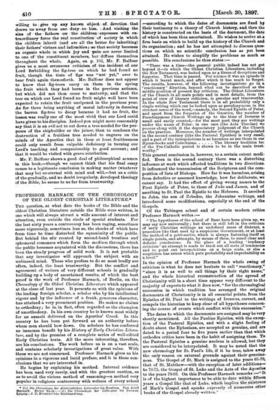UNTHINKA.BLES.* THIS is a lively little book on a not
very lively subject. The first essay, " How to Believe in Nothing," is a very amusing attempt to show how the metaphysical philosophers confound themselves and each other by proving that what they are obliged to think is unthinkable, and that if they wish to believe in nothing, they can easily have good plausible arguments for regarding the whole universe as a world of illusions. It is obvious, however, that Mr. F. Balfour does not really mean to justify intellectual Nihilism, for he concludes his essay by a very strong hint that whatever else is possible, such Nihilism is impossible to the human mind ; and
in fact the essay is intended to guard us against swallowing all the sophistries of the philosophers who love to confound us with their paradoxes,—and is not intended to deliver us over captives to their demonstrations. For instance, in discussing Mr. Karl
Pearson's dogmatic scepticism, he quotes from him a sentence asserting the utter folly of believing that our own sense- impressions convey to us any knowledge of reality, and then goes on to inquire why Mr. Pearson took the trouble to write a book which can only produce an untrustworthy sense- impression on other people, and one, moreover, which they are bound by his own principles, if the argument he sets forth should prove in any way contagious, to reject as a phantom of their own imagination :—
" Of the world outside sense-impression science can only logically infer chaos, or the absence of the conditions of know- ledge ; no human concept, order, reason, or consciousness can be logically projected into it.' This last sentence contains a fresh point, to which we shall recur later. At present we are concerned with Mr. Pearson's assurance that it is illogical and illegitimate to infer from our own sense-impressions the existence of objective realities producing them from outside, and here, we regret to say, the old Adam, or old Philistine, in as is perverse enough to see what appears to be a certain inconsistency in Mr. Pearson. Why, it asks, did Mr. Pearson write this very clever and exhilarating book ? The world whose existence he says it is illegitimate to infer is composed to all appearance of an immense variety of things ; and among those things, forming part of this imaginary and phantom world, are certainly the people for whose benefit he writes. That is to say, he writes for certain phenomena whose actual and objective existence it is illogical for him to believe in— for creations of his brain, in fact, or various groups of sense- impressions existing only in the consciousness of Mr. Pearson himself ; for by his own showing he would sin moat grievously against his own logic if he supposed them to have any actual and objective existence. And it may be lucky for him if he is correct; for it is possible that among Mr. Pearson's acquaintances there • Unthinkable". Discussed by Frederic H. Balfour. London : Richard Bentley and Son. are some who would distinctly resent being called a potential sense-impression of Mr. Pearson's consciousness. They would feel that they have as good a right to call Mr. Pearson a sense- impression as he has to call them one, or Daniel O'Connell to call the old apple-woman a parallelogram. To us, who of course are wiser, Mr. Pearson's book cannot under any circumstances be a cause of irritation. According to his own argument, it is itself nothing but a sense-impression in our subjective consciousness, without any objective reality behind it ; and no one in his senses would ever lose his temper with a sense-impression, unproduced by anything we have any logical right to affirm as existing in a sphere where pure science recognises chaos et preterea nihii."
(pp. 23-254
And in precisely the same way he deals with Mr. Spencer's de- monstration that of all knowledge, self-knowledge is the most self-contradictory because, if it be knowledge at all, it is know- ledge in which self is both the knowing subject and the known
object, and as it is impossible to be both subject and object at the same time, this is a reductio ad absurdum of the assumption. Why it should be impossible to be both sub-
ject and object at the same time Mr. Spencer does not explain ; that is really saying that what it is impossible not to believe, it is also impossible to believe, for which surely some reason should be given. The second essay on " Salvation by Meta- physics" is less lively, though it contains an extract from Lotze which shows how that most solid and reasonable of recent German thinkers encourages us to hold that our impressions of the world are really more or less just representations of reality, and are not phantoms sent to bewilder and delude us. In the essay on " What is God P " Mr. F. Balfour has some discussion of the meaning of " in.
finity " which seems to us to show that he has had no sufficient training in mathematical conceptions. He speaks of infinity
as something incapable of increase. Now we ought to be very careful in dealing with conceptions beyond our grasp, and we think it possible to show that if we keep to the very safe rule of not assuming that we know anything about infinity except as something which is beyond the largest finite number we can imagine, there are certainly in- finities of lower and higher orders, infinities which are infinitely larger than other infinities. Will not Mr. F. Balfour admit that any number when multiplied by itself yields a product larger than itself, and that the larger the number is, the more it is increased by being multiplied by itself P If that is granted,—and, of course, a million times a million is very much larger than a thousand times a thousand, and ten million times ten million is vastly larger than a, million times a million, and so on,—it follows that if you
assume the original number to be beyond all counting, it must be increased beyond all conception by being
multiplied by itself. But if so, it would be impossible to say that infinity when multiplied by infinity is not infinitely larger than the original infinity, and that
the cube of the original infinity is not infinitely larger than the square. Really and truly we cannot grasp infinity, and can only argue from what happens, as you multiply a number by itself when it is indefinitely large, to what must be supposed true of it when you assume it to be beyond all measure. And if you do this, you cannot deny that there are infinities of all conceivable orders, an infinity which is infinitely larger than another infinity, and a third infinity which is infinitely larger than the second. And so we may say of God, that he may have really infinite beings beneath him in infinite numbers, and yet that he must be infinitely greater than all these infinite beings :- " In thee what endless wonders meet, W hat various glory shines,
The crossing rays too fiercely beat Upon our fainting minds."
Mr. F. Balfour is not so trustworthy when he comes to the criticism of the Bible, as be is when be deals with the meta- physics of materialism or idealism. For example, he criticises
the moral teaching of the Old Testament, on p. 124, in a very immature and perfunctory manner, and seems unable to see how entirely his own favourite doctrine of evolution ought to apply to the gradual and irregularly evolved revelation of God which the Old Testament contains. The teaching that God is a jealous God who visits the sins of the fathers on the children is not, of course, a perfect statement of the character of the divine being, but it is a statement that was at least as true and potent for good as the Israelites at that time could bear. It represented e the fact that God requires in us a love for himself willing to • give up any known object of devotion that
draws us away from our. duty to. And visiting the sins of • the fathers ov the children expresses with ex- traordinary force the real constitution of society in which the children inherit (and are all the better for inheriting) their fathers' virtues and infirmities pa° that society becomes an organic whole in which joy and rain. are never limited to one of the constituent members, but 'diffuse themselves throughout the whole. Again, on p. 102, Mr. F. Balfour gives us a most erroneous criticism of the incident of our Lord forbidding the fig-tree on which he had found no fruit, though the time of figr was "not yet," ever to bear fruit again thenceforth. Mn Balfour does not appear to know that fig-trees carry on them in the spring the fruit which they had borne in the previous autumn, but which did not then come to maturity, and that the tree on which our Lord found no fruit might well have been expected to retain the fruit unripened in the previous year. As for there being anything of moral infirmity in dooming the barren fig-tree to decay because it had no fruit, the lesson was really one of the most vivid that our Lord could have given to his disciples. Indeed you might more reasonably say that it is an evil act to cut down a tree needed for the pur- poses of the shipbuilder or the joiner, than to condemn the destruction of a fruitless tree needed to engrave on the minds of the Apostles that in them at least fruitlessness could only result from culpable deficiency in turning our Lord's teaching and companionship to good account ; and that it would be visited with grave retribution.
Mr. F. Balfour shows a good deal of philosophical acumen in this book,—though we cannot think that his final essay comes to a legitimate conclusion in making matter (whatever that may be) co-eternal with mind and will,—but as a critic of the gradually, and no doubt irregularly, developed theology of the Bible; he seems to us far from trustworthy.







































 Previous page
Previous page